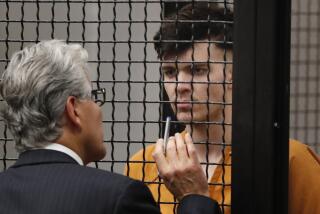Rutgers suicide: Tyler Clementi trial raises questions about hate
When Rutgers University student Tyler Clementi jumped off the George Washington Bridge in 2010, the 18-year-old freshman was seen as the victim of a cyber hate crime, one who had been bullied because he was gay.
The resulting outrage and shock were widespread, even uniting such usually opposing politicians as President Obama and New Jersey Gov. Chris Christie.
Now the trial of Clementi’s roommate, Dharun Ravi, is finishing its jury selection phase and moving toward the hearing of evidence and eventual judgment -- and questions about what constitutes a hate crime will be one focus of the proceedings.
But what once seemed simple has become far more complicated.
Opening statements in Ravi’s trial could come as soon as Friday, kicking off what is expected to be weeks of testimony, then deliberation. Ravi is charged with invasion of privacy, hindering apprehension, and tampering with a witness and evidence. He is also charged with two counts of bias intimidation, a hate crime that carries added penalties of up to 10 years in prison.
To convict, prosecutors have to prove that Ravi bullied Clementi and that he did so because his roommate was gay.
After Clementi’s death on Sept. 22, 2010, early reports suggested that Ravi had used a webcam to video Clementi having a sexual encounter with a man, then posted the video on the Web, outing the freshman.
The death shocked the nation, coming on the heels of three other suicides by teens who had been teased and bullied. Christie called Clementi’s death an “unspeakable tragedy”; talk show host Ellen DeGeneres said she was devastated and called the series of deaths a crisis.
According to accounts of the events leading up to the recording, Clementi on Sept. 19 asked to use the room for a private meeting with a male friend. Ravi then set up a webcam.
The defense maintains that Ravi did not post the video to the Web, though the images were sent from Clementi’s room to another computer in the dorm -- one where Ravi and his friend, Molly Wei, were.
“Nothing was transmitted beyond one computer and what was seen was only viewed for a matter of seconds,” Ravi’s attorney, Steve Altman, said in a prepared statement Oct. 31, 2010.
Wei has negotiated a plea deal with the prosecution and has not been charged. She is expected to be one of the star witnesses at the trial. Ravi has rejected a plea deal, insisting he is innocent of any crime.
To win on the hate crime charges, the prosecution needs to show that Ravi’s actions were because of Clementi’s sexual orientation. The defense is questioning whether Clementi was actually outed by the events. It argues that Clementi told relatives that he was gay and that Ravi learned of his roommate’s orientation through an online search.
One crucial piece of electronic evidence is an apology message that Ravi sent Clementi after he complained about the spying and requested a room change. The message was sent before the world knew of Clementi’s death.
“I’ve known you were gay and I have no problem with it,” Ravi said in his apology. “In fact one of my closest friends is gay and he and I have a very open relationship. I just suspected you were shy about it which is why I never broached the topic. I don’t want your freshman year to be ruined because of a petty misunderstanding, it’s adding to my guilt. You have a right to move if you wish but I don’t want you to feel pressured to without fully understanding the situation.”
ALSO:
National Enquirer photo of Whitney Houston in casket: Too far?
Occupiers try to repeat history, urge July 4 convention in Philadelphia
Hairstylist turns on client -- New Mexico Gov. Susana Martinez -- over gay marriage standmichael.muskal@latimes.com
More to Read
Start your day right
Sign up for Essential California for news, features and recommendations from the L.A. Times and beyond in your inbox six days a week.
You may occasionally receive promotional content from the Los Angeles Times.







